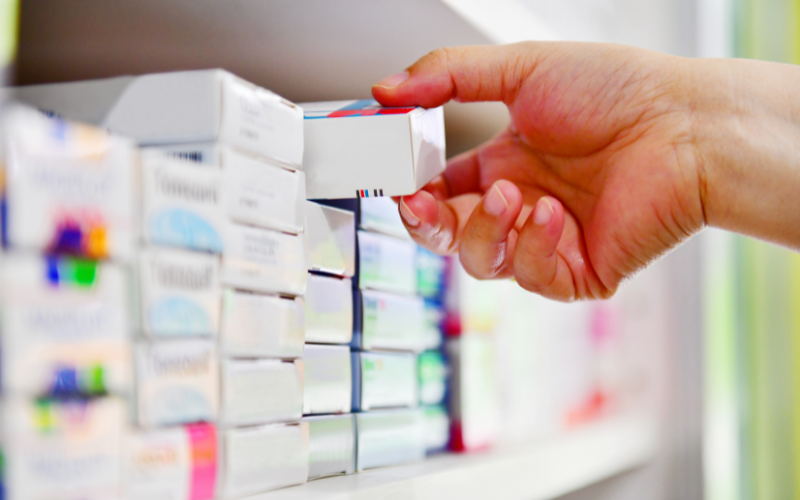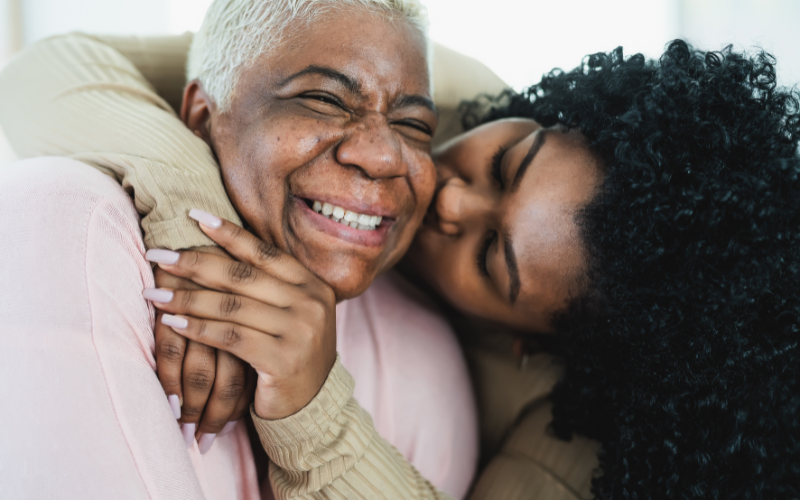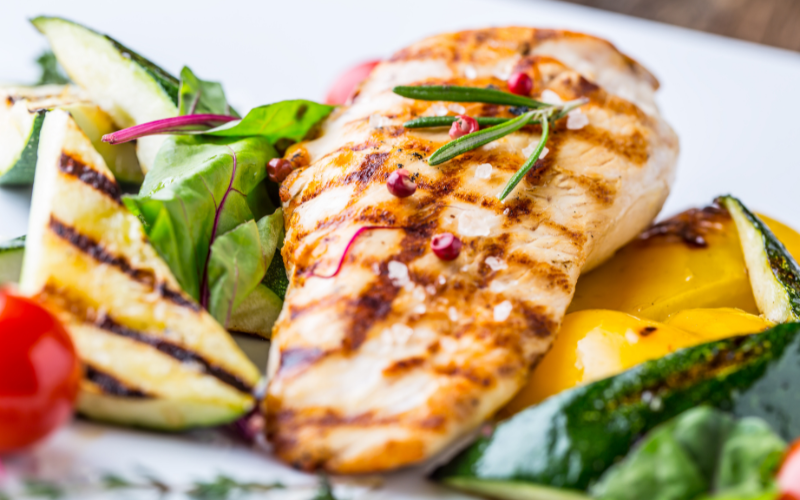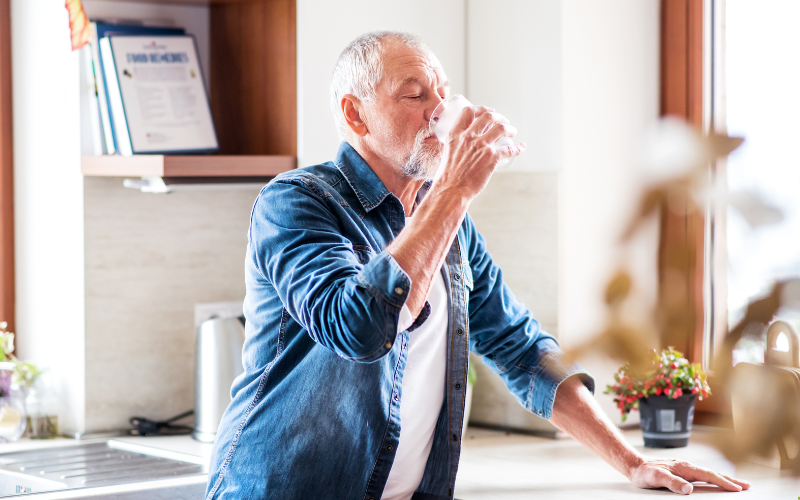
Recognizing dehydration symptoms in the elderly can be challenging. Older adults often do not feel thirst as quickly as younger individuals, making it harder to spot the signs of dehydration. As a caregiver, friend, or family member, it’s crucial to identify these signs and have strategies to ensure your elderly loved ones stay hydrated, preventing serious health issues caused by insufficient fluid intake.
Dehydration occurs when fluid loss exceeds fluid intake, leaving the body without enough water and other fluids to perform its normal functions. As we age, our bodies undergo changes, including reduced kidney function, which can cause quicker dehydration.
Some Signs That an Elderly Person is Dehydrated
When caring for an elderly loved one, it’s crucial to watch for signs of dehydration, particularly during the summer. These symptoms can appear early in the dehydration process:
- Dry mouth or tongue with thick saliva
- Cramping in the limbs
- Headache
- Weakness in the body
- Dryness of the skin
- Constipation
- Crying but not having any tears
- Irritability
- Sleeplessness
- Low output of urine
The most effective way to test for dehydration is by checking the skin on the back of the hand. Gently pinch a section of this skin using the thumb and pointer finger, lift it briefly, and then release. If the skin quickly returns to its normal position, the person is not dehydrated. Ignoring signs of dehydration can lead to serious, life-threatening conditions such as:
- Rapid, weak heart rate
- Sunken eyes
- Blood pressure that is very low
- No sweating
- Delirium
- Convulsions
- Seizures
- Kidney failure
Some other conditions that may develop due to dehydration include:
- Increased confusion – Some seniors can show increased confusion if they are dehydrated. If they have Alzheimer’s or dementia, the confusion can rapidly increase.
- Depression or anxiety – Seniors who suffer from dehydration can show signs of anxiety and depression. These go hand in hand with isolation and mood swings.
- Low energy – If you notice that your elderly loved one has low energy and they are not able to get up as much as they used to, it may increase the loss of muscle and eventually make them bed bound.
- Urinary Tract Infections (UTIs) – Those who do not drink enough fluids are prone to having Urinary Tract Infections. UTI’s can end up being a kidney or a bladder infection as there is not enough liquid to flush out the bad bacteria from your system.
- Kidney failure – Water is essential for flushing toxins from the blood and cleansing our system. Without proper hydration, the kidneys can fail to function correctly. Insufficient water intake impairs kidney function, potentially leading to kidney stones and concentrated urine, especially in the elderly.
- Comatose or death – In extreme cases, dehydration can be fatal to your body as the body can only be without water for 3-4 days. Extreme dehydration for the elderly can cause them to go into a coma and possibly die.
If you notice that your loved one has any of these symptoms and giving them fluids does not help, make sure they go to the emergency room.
How to Help Keep the Elderly Hydrated
Whether you are an elderly individual or a caregiver, maintaining proper hydration is crucial. Here are some tips to ensure adequate hydration:
- Encourage them to drink fluids: Encourage your senior loved ones to stay hydrated by drinking liquids frequently. If mobility is an issue, placing a refillable water bottle near their bed can be helpful. For those who find plain water unappealing, consider adding fruits like berries, lemons, or limes, and even mint or cucumbers for enhanced flavor. Additionally, coconut water can be a refreshing and nutritious alternative.
- Do not consume drinks with caffeine, sugar, or alcohol: Consuming drinks with sugar, caffeine, or alcohol like coffee, juice, soda and wine can speed up the dehydration process.
- Wear materials that are breathable: Make sure to wear cotton or linen so you can let the body sweat and breathe naturally. Avoid polyester type fabrics and rayon.
- Take breaks frequently: If you do any activities outside in high heat, always make sure to take frequent breaks. Usually, the heat will decrease your energy levels.
- Eat healthy meals: There are fruits and vegetables that have a lot of water and will help to keep you hydrated. This includes fruits such as watermelon, lettuce, grapefruit, tomatoes, and cucumbers.
- React right away if there are signs of dehydration: If you notice that someone you are caring for has signs of dehydration, make sure to give them water, Gatorade, Powerade, or coconut water so they can get their electrolytes replenished quickly.
- Know which medications they are taking: There are various medications that can cause the elderly to become dehydrated quicker. Make sure that you are aware of these side effects so you can give them fluid as needed.
Please note: If there are any questions or concerns regarding your loved one’s dehydration, you need to speak to their doctor before you make any major changes regarding fluid intake.
Professional In-Home Senior Care Services
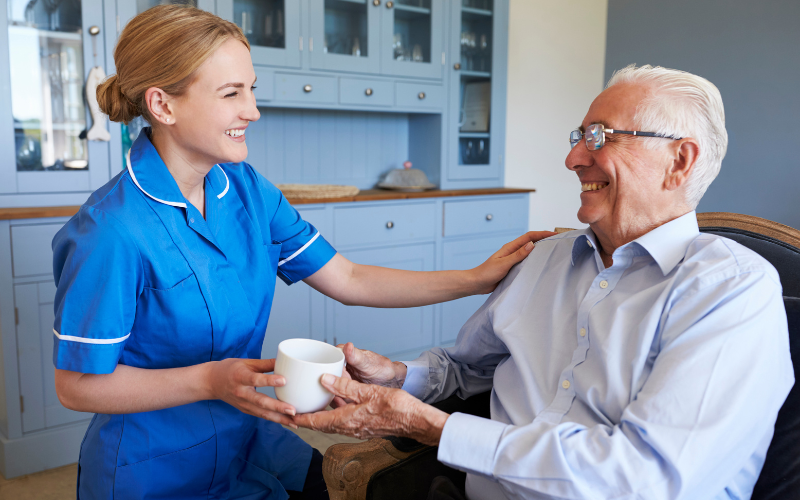
Ensuring that seniors stay hydrated is important for their safety and well-being, especially during the hottest part of the summer. By watching out for the common warning signs and encouraging your elderly loved ones to stay hydrated, you can help them avoid the problems that come with dehydration.
If you are concerned about the well-being of your senior loved ones, our caregivers at Assisting Hands Home Care can help with our in-home care services in Burleson, Cleburne, Mansfield, Midlothian, Waxahachie, TX, and the surrounding areas . Our caregivers are expertly trained to provide your loved one with the care they need, all within the comfort of their own home. They ensure proper hydration, prepare nutritious meals, and diligently manage medications, keeping an eye on potential interactions that could lead to dehydration. To learn more about Assisting Hands Home Care and our senior care services, please call us at (817) 592-8843.
Please note: If there are any questions or concerns regarding your loved one’s dehydration, you need to speak to their doctor before you make any major changes regarding fluid intake.
